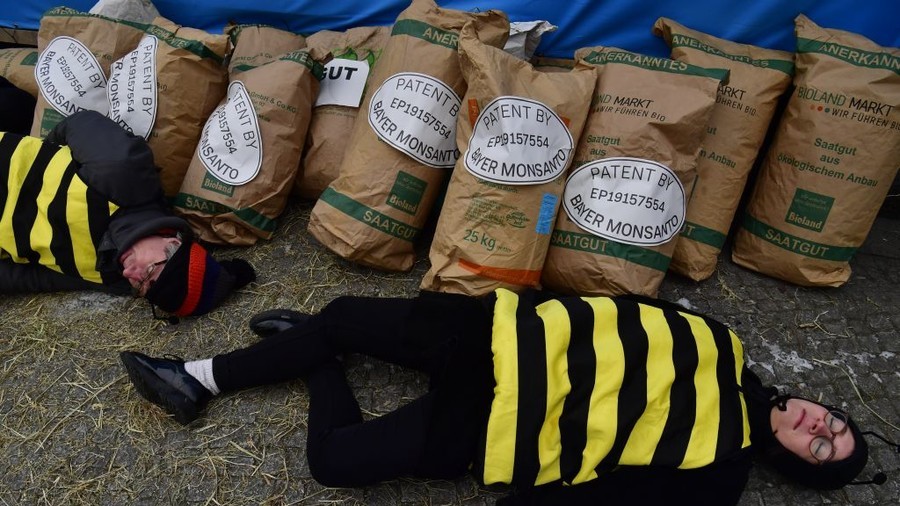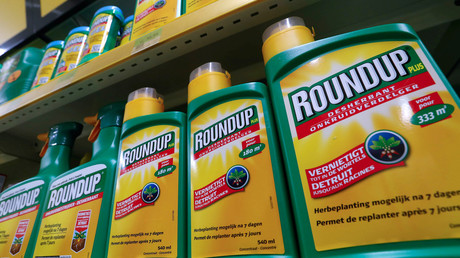Bugocalypse Now! As humanity faces ecological collapse, Monsanto shrugs
Robert Bridge is an American writer and journalist. Former Editor-in-Chief of The Moscow News, he is author of the book, 'Midnight in the American Empire,' released in 2013.

While it lacks the same Hollywood punch as an asteroid scoring a direct hit on planet Earth, or a tidal wave wiping out New York City, the mass extinction of insects would be no less catastrophic to humans.
Around the world, people are beginning to ask the same worrisome question: where have all of the bugs gone? Not that anyone particularly misses the disgusting creatures, mind you, but it would be nice to know what happened to the party.
In parts of Germany, for instance, insect populations in dozens of nature reserves around the country have plummeted by more than 75 percent over the last three decades, according to a long-term study released last year by the Krefeld Entomological Society (KES).
In another study, released just this month, it was found that arthropods – invertebrates including insects and spiders that have external skeletons – are declining at “an alarming rate.”
Focusing their investigation on Puerto Rico’s lush Luquillo rainforest, the scientists revealed that the loss of this broad range of species is leading to serious “declines in the lizards, frogs, and birds that eat arthropods.”
Now it doesn’t take much intelligence to reckon that if the lizards, frogs and birds that live off the insects are in decline, then the animals that prey on the lizards, frogs and birds are also noticing slimmer pickings. And so on up the food chain.
For the millions of people who suffer from entomophobia, that is, a morbid fear of insects, the news of dwindling bug populations will probably make for a better night sleep. After all, who really likes creepy crawling insects? Trips to the countryside would be so much more enjoyable without the little pests crawling and buzzing around.
So it’s probably no big deal if the annoying bugs start disappearing en masse, right? Well, not exactly. It may be easy to forget in our age of mass production and consumption that without those millions of annoying little pests the entire food chain would lose its primary link, throwing the entire life cycle into disarray. Needless to say, that would not be a good thing for anyone. In fact, some scientists are predicting a ‘sixth mass extinction event’ is already under way.
“Loss of insects is certain to have adverse effects on ecosystem functioning, as insects play a central role in a variety of processes, including pollination … providing a food source for higher trophic levels such as birds, mammals and amphibians,” the researchers from KES said in their report. “80% of wild plants are estimated to depend on insects for pollination, while 60% of birds rely on insects as a food source.”
The study went on to cite the economic benefits of a thriving insect world. After all, nothing gets people attention these days of runaway capitalism unless it threatens the bottom line in some way.
“The ecosystem services provided by wild insects have been estimated at $57 billion annually in the USA.”
In other words, incredible as it may seem, a big chunk of the almighty American economy is grounded on bugs, and more specifically honey bees, which pollinate an estimated $15 billion worth of crops – everything from apples to onions - annually. The tragedy, however, is that the fragile relationship between man and the natural world appears to be overloaded to the breaking point.
Bee gone
Starting in 2005, our vulnerability to the fluctuations of the natural world, which in more cases than we’d like to admit are man-made, became painfully obvious. US beekeepers began to report unusually high losses of around 30-90 percent of their hive populations, a mysterious disappearance that came to be known as Colony Collapse Disorder (CCD). A number of possible explanations have been forwarded to explain these epic losses, including pesticides, viruses and even the electromagnetic radiation emitted from cell phone towers, which can disrupt the insect’s built-in navigation system.
Such fears have dragged some of the most powerful names in corporate America into the great insect debate.
Last month, for example, researchers from the University of Texas at Austin released a paper showing a connection between glyphosate, a chemical manufactured by Monsanto (before it was acquired by Bayer AG in June), and the rapid demise of honeybees.
According to the study, not only does glyphosate, a chemical found in its popular Roundup weedkiller, damage the enzymes in the bee’s gut that protects them from pathogens, it also effectively kills the wildflowers the bees depend upon for their survival. In other words, Monsanto has unwittingly devised (for who would market such a devilish thing intentionally?) a nice double whammy against the industrious bees upon which so much depends.
Not surprisingly, Monsanto rejected the academic findings outright.
"Claims that glyphosate has a negative impact on honey bees are simply not true. No large-scale study has found any link between glyphosate and the decline of the honeybee population,” a Monsanto spokesperson said in a statementreported by The Guardian.
Here it is worth mentioning that not only honey bees are at risk of dying from glyphosate. In August, a San Francisco jury ordered Monsanto to pay $289 million to Dewayne Johnson, a former school groundskeeper, saying the weedkiller contributed to his terminal illness. Johnson was diagnosed with non-Hodgkin’s lymphoma in 2014 at age 42 after using the chemical at his job for many years. This week, Monsanto lost a bid for a new trial, with the judge reducing the amount of compensation awarded to Johnson to $78 mn.
Of course, there are many other businesses aside from Monsanto, the poster boy for unethical corporate behavior, that are contributing to the loss of animal and insect life, threatening to create the greatest mass extinction event since that moment when an asteroid, as one theory goes, hit the earth and wiped out the dinosaurs.
However, considering how much excessive debate there is over every reported environmental problem, as is the present case with the apparent loss of insect populations, nothing ever gets resolved since nobody can ever agree on the ultimate source of the problem, even when the academics appear to give us all the hard evidence we need.
At the same, for anyone who has watched the film 'Thank You for Smoking' knows, many transnational companies regularly spend a king’s ransom on smooth-talking lobbyists who deceive everyone into believing their product is environmentally safe – even when it clearly is not. As it stands, humanity is stuck in a loop while the environmental problems continue to worsen.
All this talk and no action has led the planet to a dangerous crossroads where eventually a decision must be made as to who or what is killing the world’s insects before a crash of epic proportions occurs.
Our ability to free ourselves from this latest quandary depends on our ability to correctly answer the following question: will transnational corporations ever be able to concede that their products are harmful to the environment, if such honesty would mean losing many millions, even billions of dollars in profit? Tragically, it seems that mankind’s level of common sense has not yet reached such a level of development, and that could be the cause of our ultimate downfall as a species. The loss of simple common sense.
Think your friends would be interested? Share this story!
The statements, views and opinions expressed in this column are solely those of the author and do not necessarily represent those of RT.





0 Comments:
Post a Comment
Subscribe to Post Comments [Atom]
<< Home